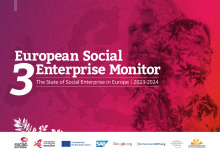The European Social Enterprise Monitor Report, 2023-2024
Dive into the vibrant world of Europe’s social enterprises
Starting as niche players, social enterprises are now transforming every sector of the economy. They are a tangible proof that business success is not just measured in profits, but also in social and environmental impact. To document this dynamic social enterprise landscape across Europe, the ESEM 2023-2024 Report, led by the Euclid Network and national partners, uncovers a panorama of over 1,800 organisations from 31 European countries. The comprehensive analysis includes characteristics of ESEM social enterprises, their social and environmental impact (and its measurement & management practices), as well as governance structure, revenues and financing models. General sample statistics are intertwined with case studies from specific countries. A separate section is dedicated to barriers and enablers to social enterprises, mainly those in terms of political and public support, legal frameworks, financial support, and technical assistance.
This report is more than just data: it reveals trends, opportunities and challenges for social enterprises and their support organisations in Europe. It constitutes a compass for policy-makers, funders, and legislators, helping them craft better support actors bringing meaningful change. And, last but not least, it builds solid bases for future research.
What is a “social enterprise”?
In this report, the Euclid Network uses the definition of a social enterprise provided by the European Commission. According to the Social Business Initiative (2011) and the Social Economy Action Plan (2021), a social enterprise is:
- “An operator in the social economy whose main objective is to have a social impact rather than make a profit for their owners or shareholders;
- which uses its profits mainly to achieve these social goals;
- which is managed in an accountable, transparent and innovative way, in particular by involving workers, customers and stakeholders affected by its business activity.”
The European Commission has further explained that a social enterprise has three dimensions, namely: social, entrepreneurial and governance. It recognises that understandings of the term can vary across countries, organisations and specific contexts.
Contents
- About Euclid Network
- Forewords (European Commission, Euclid Network)
- Welcome Words (SAP, Bertelsmann Stiftung, World Economic Forum, Schwab Foundation for Social Entrepreneurship)
- Executive Summary
- Introduction
- Purpose, history and future of the study
- Defining social enterprise
- Participation and methodology review
- Characteristics of ESEM social enterprises (prioritisation of social and environmental impact, legal forms and statuses, age and development stage, business sector, etc.)
- Social & environmental impact
- Beneficiaries
- Areas of impact
- Internalising impact
- Impact Measurement & Management (its frequency and motivation, data usage, experiences and challenges, reasons for not using it)
- People & governance (staff, volunteers, diversity and inclusion, place of women, etc.)
- Revenues and financing (sources of income, social procurement, levels of revenue, profits and reinvestments, financial sustainability, external financing)
- Barriers & enablers (overview of various barriers, political support, legal frameworks, ecosystem support etc.)
- Conclusion
- Appendix 1: Methodology
- Survey logistics, promotion and launch
- Data cleaning process
- Currency conversions
- Legal form and status recodes
- Ecosystem support organisation recodes
- Appendix 2: Bibliography
- Acknowledgements
